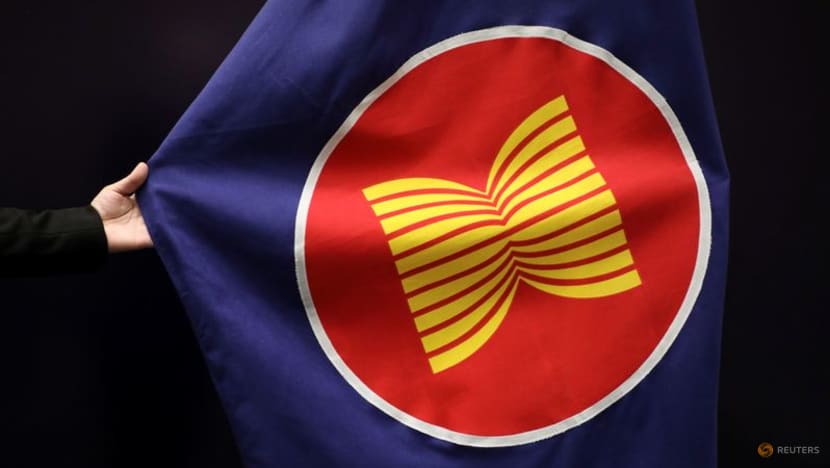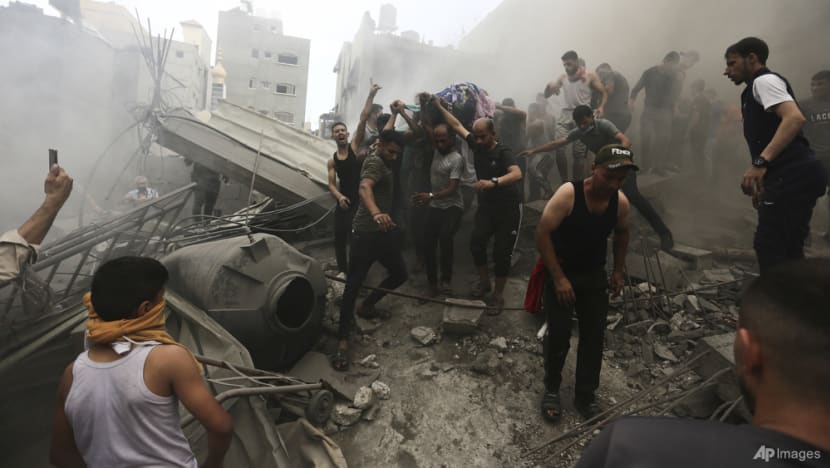Israel-Hamas conflict could have implications on ASEAN centrality as members adopt different stances: Experts
Members of the regional bloc have issued separate statements on the crisis, but the grouping has yet to respond as a whole.

A worker adjusts an Association of Southeast Asian Nations flag at a meeting hall in Kuala Lumpur on Oct 28, 2021. (File photo: Reuters/Lim Huey Teng)
SINGAPORE: The ongoing Israel-Hamas war could affect the unity and relevance of the Association of Southeast Asian Nations (ASEAN), whose members have adopted varying stances on the crisis, said experts.
This comes as the recent attack by Palestinian militant group Hamas on Israel sparked a deadly war with no clear solution in sight, they added.
ASEAN members have issued separate statements on the crisis, but the regional grouping has yet to respond as a whole.
ASEAN’S RELEVANCE ON GLOBAL STAGE
“I think it shows that there is a wide spectrum of positions among ASEAN member states that would be quite hard to bridge,” said Ms Joanne Lin, lead researcher and co-coordinator of the ASEAN Studies Centre at the ISEAS–Yusof Ishak Institute.
“And I think it would be difficult to forge a common position or outlook, considering the very diverse foreign and security policies among ASEAN countries.”
Muslim-majority countries Indonesia, Malaysia and Brunei do not officially recognise Israel and have no diplomatic relations with it. ASEAN members also adopt varying positions on the Palestinian territories.
However, the lack of a unified stance on the conflict could diminish the bloc's relevance on the global stage, said observers.
Ms Lin said: “ASEAN cannot play an anchoring role if it is unable to maintain its unity and credibility, and that is vis-a-vis internal challenges. Challenges like Myanmar and regional flashpoints such as the South China Sea.”
The Singapore government on Monday (Oct 16) said it is deeply distressed by the increasing civilian casualty toll and deepening humanitarian crisis in the Gaza Strip, and urged all parties to abide by international humanitarian law.
"Hamas deliberately targeted civilians, murdering and kidnapping them, and perpetrating abhorrent acts of terror. These atrocities cannot be justified by any rationale. We call for the immediate and safe release of all civilians taken hostage by Hamas," said Singapore's Ministry of Foreign Affairs (MFA).
"Israel has the legitimate right to defend its citizens and its territory. However, in exercising this right Israel must comply with international law, including the laws of war. It must do its utmost to protect the safety and security of civilians."
ASEAN, GULF STATES TO DEEPEN TIES
The war comes as ASEAN leaders are set to travel to Saudi Arabia for an inaugural summit with their Gulf counterparts on Friday.
ASEAN and the Gulf Cooperation Council (GCC) established ties in 1990. The GCC is made up of Saudi Arabia, Kuwait, United Arab Emirates, Qatar, Bahrain and Oman.

“It's actually a milestone in ASEAN-GCC relations. They have been having meetings on the sidelines of the UNGA (United Nations General Assembly) at the ministerial level,” said Ms Sharon Seah, senior fellow and coordinator at the ASEAN Studies Centre.
“So there will be a quickening of that pace. There will be more tangible cooperation arising from this meeting.”
But the meeting will likely be overshadowed by the ongoing Israel-Hamas crisis. Even if the leaders discuss ways to promote peace, efforts are unlikely to bear fruit, said analysts.
“There is no appetite at the moment for a diplomatic approach,” said Dr Jean-Loup Samaan, senior research fellow at the National University of Singapore's Middle East Institute.
“The clear momentum is for the preparation of the Israeli operation on Gaza. The only window of opportunity that we can imagine is after that operation. The problem becomes when does that operation end, and that is not very clear.”
CONFLICT LIKELY TO CHANGE DYNAMICS OF GEOPOLITICS
Experts noted that the Israel-Hamas war is likely to change the dynamics of geopolitics.
The United States, for instance, has thrown its weight behind Israel. But that has raised questions of whether Washington’s attention would be diverted from the Ukraine crisis, and if its commitment would move further away from Southeast Asia.
Another superpower China is less vocal. Observers believe Beijing is positioning itself as a neutral party – a calculated move to stay away from the conflict.
Meanwhile, the Israel-Hamas war has far-reaching implications for the Middle East, with observers saying there is a real fear that violence could spread in the region.
“That definitely changes the Middle East.”




















